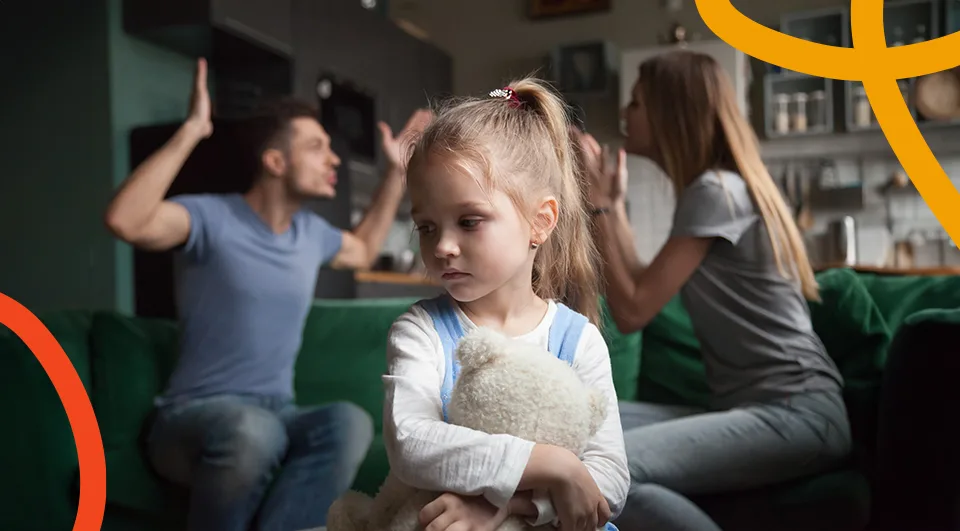Join our online parenting class and discover how parents arguing may affect the child. Learn from parenting experts how to stop arguing with your partner and children, fostering harmony in your family. Become the best partner and parent, and enjoy a fulfilling family life.
Learn about the 3 psychological needs that are not met when parents argue and what you can do to improve your family communication patterns.
Find out how to stop arguing with your partner and how to prevent having a child going back and forth between parents.
Get to know the 5 ways parents’ arguing sabotages progress in parenting a child and why yelling, blaming, and “I know better!” won’t get you very far, even if you’re right.
Discover 3 ground-breaking practical techniques that can be used immediately to stop parents’ fighting and set the stage for healthy and productive family communication.

How did everything start to look like a cruel competition? Kids pick sides, and they seem confused. A child going back and forth between parents is not easy to discipline. Parents are feeling overwhelmed and don’t know where to start to get things back on track. Parents’ arguing adds fuel to the parent child conflict. Everyone feels exhausted and unmotivated by the end of the day.
Who helps the kids do their homework? Who takes them to art class? Why isn’t the other one planning ahead for the weekends? The kids are usually present and witness their parents arguing about these things.
There are so many unanswered questions, yet no one wants to really talk things through, thinking there’s no point to that. Healthy family communication goes out the window, leaving the home either too loud or ridiculously silent.
Most of our problems and disagreements stem from our different life experiences, which are usually determined by our perceptions, values, and beliefs. It’s quite common to see parents arguing about disciplining their kids because they want to avoid or replicate the parenting style they’ve been raised with.
It’s quite easy to forget about parents’ fighting effect on child development when we’re heated up. Think about it! What kind of problem-solving behaviors do we model for our children? We do not really stop to notice, do we?
What if you are both right? What if your conflicts are driven by measurable elements and depend on your basic needs, differences in parenting styles, or expectations you never talk about but assume the other one is aware of?
Maybe the problem lies in your family communication pattern. Ready to find out which that is?
New-generation parents see that parenting today is different and harder. We see parents arguing about things that might have been too small to even think about in the past.
Studies show that we spend more time with our children than we used to. Family communication is more personality-oriented. We are more understanding of their problems; we talk about emotions and are interested in hearing their thoughts. Most of us have a desire to keep things positive, even those of us who are more authoritarian. While there are many parenting resources, some of them are too general or do not offer practical step-by-step solutions.
That’s what we set out to change with our online events. In our, “I’m sick of you! How to stop arguing with your partner and kids and work as a team” online masterclass, you will find out what you can and cannot change about the other parent.
Know when to insist and when to back off and allow the natural consequences to take place. Always remember that even if your partner has a different approach, they have your children’s best interests in mind. Parental conflict impact on child development is a thing to always take into account.
Understand how your upbringing has shaped the way you raise your children and how you interact with your spouse, partner, or other caregivers with whom you share parenting.
Join us for an online event if you want to learn how to address common parenting disagreements effectively and get kids to listen to both of you.
References
Dotti Sani, G. M., & Treas, J. (2016). Educational Gradients in Parents’ Child-Care Time Across Countries, 1965–2012. Journal of Marriage and Family, 78(4), 1083-1096. https://doi.org/10.1111/jomf.12305
Hess, S. (2022). Effects of Inter-Parental Conflict on Children’s Social Well-Being and the Mediation Role of Parenting Behavior. Applied Research Quality Life 17, 2059–2085. https://doi.org/10.1007/s11482-021-10022-y
Patrick Ney is an author and Lead Trainer at All About Parenting, a global parenting organization active in more than thirty countries around the world. An inspiring speaker who has featured at Tedx, he has led hundreds of workshops, seminars and meetings for more than a hundred thousand parents worldwide. His first book, “When At the Zoo Watch the Humans” was a No. 1 Amazon Best Seller and he’s just released his first book for children, “What Do Humans Taste Like?” a fun book designed to help children develop theory of mind thinking.
Witnessing family conflict is indeed tough, especially when you’re trying to maintain a positive environment. It’s natural for family members to have different personalities, beliefs, and values. It’s like a puzzle where not all pieces seem to fit perfectly, but there are ways to work through it.
Sometimes, we see two parents fighting over the smallest things regarding the kids.
The first step is to encourage open and honest family communication. Sometimes, people aren’t aware of the impact their behavior has on others. You could try to have a calm and caring conversation with your child and their partner.
Share your concerns about the constant arguing and how it’s affecting the grandchildren. It’s important to do this without placing blame or taking sides. Instead, focus on the well-being of the children. You might suggest they find a quiet time to talk about their issues or even seek professional help like couples counseling. This could provide them with a safe space to work through their problems.
We talk about family conflicts and offer actionable solutions in our online masterclass: I’m sick of you! How to stop arguing with your partner and kids and work as a team,
Second, you can focus on creating a supportive and peaceful environment for your grandchildren. Their parents’ arguing can often make them feel insecure and scared. You can be a source of stability and love for them. Engaging them in activities, listening to their concerns, and simply spending quality time with them can make a huge difference. You could also gently explain to them that sometimes adults have disagreements, but it’s not their fault; they are always loved and cared for.
It’s normal for families to experience conflict, and it’s not always possible to avoid disagreements. It’s easy to slip into the old family communication pattern. However, by always coming back to a culture of respect and understanding and focusing on shared values and love, families can often find their way through challenging times together.
Need more practical solutions on this or other topics? Sophie, our clever AI assistant, is ready to help you.
When you try to share your thoughts and worries, but it seems like your partner doesn’t understand or doesn’t want to listen, it can create problems in your relationship and make the whole family feel stressed. Here are a few things to improve when parents argue about their kids.
First, aim to find the right time to talk. Timing could be key. Try to find a calm moment when neither of you is stressed or tired. Avoid starting the conversation right in the middle of a conflict or when you’re both busy with other tasks. A quiet evening after the kids are in bed or a peaceful morning can be good times. Parental conflict impact on child development is widely studied. Try to make sure the kids are not present if the process of getting to better communication is tedious at first.
We share more insights about setting the stage for improving family communication in our online masterclass: I’m sick of you! How to stop arguing with your partner and kids and work as a team.
Next, although it can get pretty frustrating to feel ignored, try to address your partner with empathy. Instead of saying things like “You never listen to me,” try using “I” statements. For example, “I feel upset when we can’t discuss our kids’ issues calmly.” This approach is less likely to make your partner defensive and more likely to encourage a constructive conversation.
Sometimes, parents’ arguing escalates because both partners want to be heard, but neither feels listened to. Try to really listen to what your partner has to say without interrupting. Show that you understand their perspective, even if you don’t agree with it. This can help your partner feel respected and more open to hearing your views.
Lastly, if you feel like you tried everything, it could be the time to seek outside help. A trusted friend, a family member, or a professional counselor can offer neutral advice and help both of you find ways to communicate better. It might get things unstuck and help you see other perspectives.
Need more practical solutions on this or other topics? Sophie, our clever AI assistant, is ready to help you.
It’s normal to see parents arguing sometimes. No relationship is perfect, and it’s unrealistic to think that there will never be any arguments. In fact, when kids see their parents having small disagreements but solving them in a kind and respectful way, it can actually be a good thing. It teaches them how to handle their own problems in the future. They learn that it’s okay to have different opinions and that talking things out calmly can keep a relationship strong.
On the other hand, when the family communication patterns are particularly negative, parents’ fighting effect on child development is quite dramatic.
First, when the most important people in their lives, their mom and dad, don’t get along, it can be scary and confusing for them. Kids often look up to their parents for interacting with the world, so what they see at home really matters. If kids see their parents yelling or being mean to each other, it can be really frightening for them. They might feel unsafe, and this can lead to problems like trouble sleeping or becoming anxious.
Second, if there’s any kind of aggression, like shouting, hitting, or throwing things, the impact on kids can be even bigger. This can leave a deep mark on their emotional development and social interactions. Studies show that children who witness aggression between their parents are more likely to become withdrawn or aggressive themselves.
We talk openly about the challenging aspect of parents fighting and the parent child relationship in our online masterclass: I’m sick of you! How to stop arguing with your partner and kids and work as a team.
Lastly, outside help or professional counseling can benefit the whole family. A trustworthy and impartial family member or a family counselor can help arguing parents consider other perspectives for resolving their issues.
The goal is to help parents to talk things out without raising their voices or saying hurtful things. This will show kids that even when people disagree, they can still love and care for each other. And that’s a really important lesson for them to learn.
Kids thrive when their parents get along. Either still together or separated, children shouldn’t feel like they have to choose between their parents. The most important thing is to make sure your child feels safe, loved, and not caught in the middle of any arguments. Here are a few steps that can help improve the parent child relationship and make them feel more secure:
First, find common ground. This means setting up some rules that are the same with both parents. For example, you both might agree that bedtime is at 9 p.m. or that eating healthy is important. These common rules help kids feel more secure because they know what to expect, no matter which parent they’re with. Plus, when parents show they can agree on some things, it makes kids feel more at peace.
Second, model kind and respectful family communication in spite of misunderstandings. If one parent uses mean words about the other, it can make the child feel really upset and confused. They might start to think it’s okay to talk that way, too, when addressing the other parent. This could backfire eventually. They might constantly ask themselves, “Why do parents argue?”. The pressure of having to choose between parents is too great, and it might make the child withdrawn, anxious, and unsure. Instead, try to show your child that even if you don’t always agree with the other parent, you can still talk about them in a respectful way.
We talk more about the parental conflict impact on child development in our online masterclass I’m sick of you! How to stop arguing with your partner and kids and work as a team.
Most specialists suggest trying to have your arguments or discussions about parenting away from your child. They don’t need to hear everything, especially if their parents’ arguing might worry them or make them feel like they’re in the middle of it all.
Always be there to support your child emotionally. Let them know it’s okay to talk about their feelings and that no matter what happens between the parents, they are loved and valued by both. This support can make a big difference in how they handle the situation.
The family communication pattern depends on a lot of factors. It might come from the tension of having different opinions and not being able to have it our way. Sometimes, it can come from our own upbringing. A lot of how we communicate comes from how we were raised and the examples we saw in our own parents. It’s common for people to repeat the same patterns they saw growing up. Here’s how to stop arguing with your partner:
First, understand your communication styles. Some people like to talk things out right away, while others need time to think before they discuss a problem. Knowing this about each other can help prevent misunderstandings and arguments. If the conversation starts to turn into a fight, it’s okay to take a break. You can say something like, “I think we’re both getting too upset. Can we take a break and come back to this discussion in a little while?” This can help both of you calm down and talk more productively later.
Next, focus on the issue, not the person. When you have a disagreement, try to focus on the issue at hand rather than trying to change the other person. For example, if you’re upset about the house being messy, talk about the mess, not about how your spouse is always untidy. This way, you’re addressing the problem without blaming or trying to change the other person. Instead of saying, “You never help around the house,” try saying, “I feel overwhelmed when I have to do all the cleaning by myself.” This kind of statement is less likely to make your spouse defensive and more likely to lead to a constructive conversation.
We share more insight on what to do when parents argue in our online masterclass: I’m sick of you! How to stop arguing with your partner and kids and work as a team.
Communicating well with your spouse takes practice and patience, but having a peaceful and understanding relationship is worth it. The goal is not about never having disagreements but about handling them in a healthy and respectful way.
Most powerful is realising and admitting that I’m not perfect but normal parent, allowing myself to go on and try again




Thank you for subscribing to our newsletter.
You will start receiving our newsletter.